Clancy Tucker's Blog, page 223
May 7, 2016
8 May 2016 - STEVE MCMILLEN - Guest Author
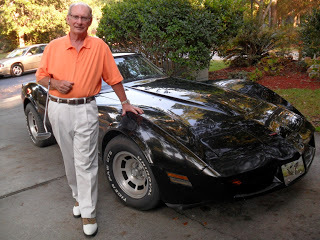
STEVE MCMILLEN
- Guest Author -
G'day guys,
Welcome to my interview with a man who is damn good at golf ... And also writes.
Welcome, Steve ...
1. TELL US A LITTLE ABOUT YOURSELF AND YOUR WRITING JOURNEY.Born and raised in Ohio. I am a US Army Veteran. I married my high school sweetheart (twenty years after graduating). I spent 20+ years in the Oil & Gas Industry and ten years as a Golf Teaching Professional. Got tired of the cold, ice and snow up North and we finally moved to Myrtle Beach, SC., which is the setting for my first two books.
2. WHEN AND HOW DID YOU BECOME A WRITER?When we got to Myrtle Beach, it was my plan to be a stay-at-home mom since my wife had a good paying job. I could load the dishwasher, put laundry in the washer and dryer. I could run the sweeper and occasionally, mop the tile floors. That would allow me to play golf five or six times a week. Well, my wife had no sense of humour. She thought I should get a job. I had always been interested in real estate so I got my license and went to work. I had to cut my golf to once a week. Everything was fine until the real estate crash in 2008. All of a sudden, I had a lot of spare time. My wife suggested I write that novel I had always talked about writing. Let the story begin.
3. WHAT TYPE OF PREPARATION DO YOU DO FOR A MANUSCRIPT? DO YOU PLAN EVERYTHING FIRST OR JUST SHOOT FROM THE HIP?I usually know how the story will begin and end but I have no idea what is going to happen in the middle. My story just sort of evolves as I write.
4. WHAT DO YOU ENJOY MOST ABOUT BEING A WRITER?Doing the book signings, and talking to the people. I also enjoy going to book clubs and meeting the readers. I try to have fun with it.
5. WHAT IS THE HARDEST THING ABOUT BEING A WRITER?The editing and re-writing. Not fun.
6. WHAT WERE YOU IN A PAST LIFE, BEFORE YOU BECAME A WRITER? I was a golf teaching pro, spent 20+ years in the oil & gas industry, and a marketing exec for a sign company.
7. WHAT IS YOUR GREATEST WRITING ACHIEVEMENT? My first book, MURDER ON THE FRONT NINE and my second book COUGARS AT THE BEACH.

8. WHAT ARE YOU WORKING ON AT THE MOMENT? I am almost finished with my third book DEATH ON MT. PLEASANT, which is the thord instalment in the Mickke D Grand Strand Murder Mystery series.
9. WHAT INSPIRES YOU? The thrill of creating something that may be around forever.
10. WHAT GENRE DO YOU WRITE? Murder mystery thriller.
11. DO YOU HAVE ANY TIPS FOR NEW WRITERS? Stick with it, don’t give up and have fun doing it.
12. DO YOU SUFFER FROM WRITER’S BLOCK? Sometimes
13. DO YOU HAVE A PREFERRED WRITING SCHEDULE? Not really.
14. DO YOU HAVE A FAVOURITE WRITING PLACE? My office looking out my bay window.
15. WHAT IS YOUR GREATEST JOY IN WRITING? Having someone say how much they enjoyed reading my books.
16. WHO IS YOUR FAVOURITE AUTHOR AND WHY? Steve Berry, because I met him and did a workshop with him and James Patterson because I just like the way he writes.
17. WHAT’S THE GREATEST COMPLIMENT YOU EVER RECEIVED FROM A READER? Being told they could not put the book down and they stayed up all night to finish it.
18. WHAT WAS THE WORST COMMENT FROM A READER? Not many and I don’t dwell on them.

19. WRITERS ARE SOMETIMES INFLUENCED BY THINGS THAT HAPPEN IN THEIR OWN LIVES. ARE YOU? Absolutely, my books have a lot of my experiences in them.
20. OTHER THAN WRITING, WHAT ELSE DO YOU LOVE? I like to play golf.
21. DID YOU HAVE YOUR BOOK / BOOKS PROFESSIONALLY EDITED BEFORE PUBLICATION? Yes!!!!! But even the best editor still misses things.
22. DESCRIBE YOUR PERFECT DAY. Sunshine, 72 degrees, two hours of writing, three or four hours of book signings. It doesn’t get any better than that.
23. IF YOU WERE STUCK ON A DESERT ISLAND WITH ONE PERSON, WHO WOULD IT BE? WHY? To be politically correct, I’ll say my wife.
24. WHAT WOULD YOU SAY IF YOU HAD THE CHANCE TO SPEAK TO WORLD LEADERS? Get your heads out of your asses, form a coalition and destroy ISS.
25. WHAT ARE YOUR PLANS FOR THE FUTURE? Hopefully keep on writing.
26. WHAT ARE YOUR VIEWS ON BOOK TRAILERS? DO THEY SELL BOOKS? Never used one.
27. DO YOU SEE YOURSELF IN ANY OF YOUR CHARACTERS?Absolutely, my alter ego is my main character Mickke D.
28. DOES THE PUBLISHING INDUSTRY FRUSTRATE YOU? It did but I got over it.
29. DID YOU EVER THINK OF QUITTING? No
30. WHAT WAS YOUR FAVOURITE MANUSCRIPT TO WRITE? WHY? My first one. It proved I could do it.

31. HOW WOULD YOU DEFINE ‘SUCCESS’ AS A WRITER. Having your book published and knowing it was a pretty good book. Receiving that first good review.
32. WHAT SHOULD READERS WALK AWAY FROM YOUR BOOKS KNOWING? HOW SHOULD THEY FEEL? My only hope is that they were entertained.
33. WOULD YOU LIKE TO HAVE YOUR BOOKS MADE INTO MOVIES? EVER WRITTEN A SCREENPLAY? Of course, but I’m not holding my breath. Never wrote a screenplay.
34. HOW MUCH THOUGHT GOES INTO DESIGNING A BOOK COVER? A whole lot. Your cover is the most important part of the book. You need the reader to want to read that book.
35. WHAT’S YOUR ULTIMATE DREAM? Being picked-up by a literary agent and a big publisher, but again I’m not holding my breath.
36. WRITING IS ONE THING. WHAT ABOUT MARKETING YOU, YOUR BOOKS AND YOUR BRAND? ANY THOUGHTS? You have to market your books, no one else is going to do it for you. They may say they will but it is totally up to you.
37. ARE YOUR BOOKS SELF-PUBLISHED? Yes.
38. DESCRIBE YOURSELF IN FIVE WORDS. Honest, true to my word.

39. WHAT PISSES YOU OFF MOST? Politicans.
40. WHAT IS THE TITLE OF THE LAST BOOK YOU READ? GOOD ONE? My all time favorite is “Midnight in the Garden of Good and Evil”
41. WHAT WOULD BE THE VERY LAST SENTENCE YOU’D WRITE?Life was good to him and he enjoyed it to the hilt.
42. WHAT WOULD MAKE YOU HAPPIER THAN YOU ARE NOW? CARE TO SHARE? World peace.
43. ANYTHING YOU’D LIKE TO ADD? Thank you for having me.

Upcoming book:
'Death on Mt. Pleasant'
In Steve McMillen’s latest Mickke D adventure, Death on Mt. Pleasant, we find our hero back in his home town of Lancaster, Ohio where he is trying to help an old high school friend determine whether or not his friends sister’s tragic death was an accident or a horrific homicide. As usual, he ends up hip deep in bad guys and twisted plots along the way.
Eventually returning to the beach for some R & R, he finds things are heating up there as well and it’s not the outside temperature. Has his old salvage friend TC finally found the buried pirate treasure? Who else may be looking for the treasure and him as well? Has his old flame Beverly resurfaced and if so, how will he react?
If you enjoyed Steve’s first two books in the Mickke D Murder Mystery Series, Murder on the Front Nine and Cougars at the Beach, you won’t want to miss this third action-packed thriller. A must read for your beach read bag.

WEBSITE

Clancy's comment: Thanks, Steve. Keep going. Love ya snappy answers.
Happy Mother's Day to all you mums. Love ya work.

I'm ...

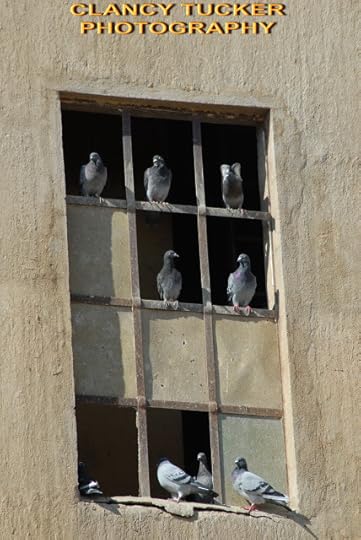
Published on May 07, 2016 15:56
May 6, 2016
7 May 2016 - CHICAGO - 'THE WINDY CITY'
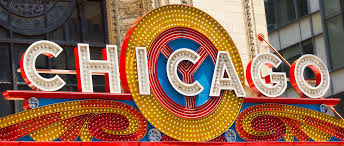
CHICAGO 'THE WINDY CITY'
G'day folks,
Ever been to Chicago? Chicago, on Lake Michigan in Illinois, is among the largest cities in the U.S. Famed for its bold architecture, it has a skyline bristling with skyscrapers such as the iconic John Hancock Center, sleek, 1,451-ft. Willis Tower and neo-Gothic Tribune Tower. The city is also renowned for its museums, including the Art Institute and its expansive collections, including noted Impressionist works.
The origins of Chicago’s famous nickname are not entirely clear. The most obvious explanation is that it comes from the frigid breezes that blow off Lake Michigan and sweep through the city’s streets. However, another popular theory holds that it was coined in reference to Chicago’s bloviating residents and politicians, who were deemed to be “full of hot air.”
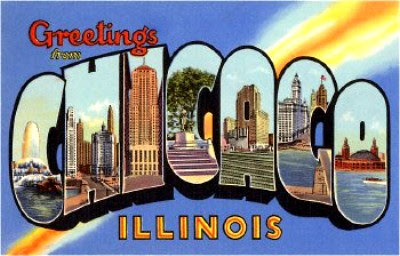
Proponents of the “windbag” view usually cite an 1890 article by New York Sun newspaper editor Charles Dana. At the time, Chicago was competing with New York to host the 1893 World’s Fair (Chicago eventually won), and Dana is said to have cautioned his readers to ignore the “nonsensical claims of that windy city.” Dana is often credited with popularizing the “Windy City” moniker, yet according to David Wilton’s book “Word Myths: Debunking Linguistic Urban Legends,” researchers have never managed to find his original article. Many now dismiss it as a myth.

Even if Dana’s editorial does exist, it’s unlikely that either he or the World’s Fair debate were responsible for popularizing Chicago’s nickname. Etymologist Barry Popik, a longtime researcher of the Windy City question, has uncovered evidence that the name was already well established in print by the 1870s—several years before Dana.
Popik also dug up references showing that it functioned as both a literal reference to Chicago’s windy weather and a metaphorical jab at its supposedly boastful citizenry. Many of the citations are found in newspapers from other Midwest cities, which were in a rivalry with Chicago over who was the region’s main metropolis. For example, an 1876 headline in the Cincinnati Enquirer used the phrase “That Windy City” in reference to a tornado that swept through Chicago.

“The Cincinnati Enquirer’s use is clearly double-edged,” Popik told the Chicago Tribune in 2006. “They used the term for windy speakers who were full of wind, and there was a wind-storm in Chicago. It’s both at once.” Since Chicago had previously used its lake breezes to promote itself as a summertime vacation spot, Popik and others conclude that the “Windy City” name may have started as a reference to weather and then taken on a double meaning as the city’s profile rose in the late-19th century.
Interestingly, although Chicago may have gotten its nickname in part because of its fierce winds, it’s not the breeziest town in the United States. In fact, meteorological surveys have often rated the likes of Boston, New York and San Francisco as having higher average wind speeds.

Clancy's comment: Wait! Listen, can you hear that sound?

Great review for 'Kick-Ass' Tyler:
'Kick-Ass Tyler' is another ripping yarn from Clancy Tucker. Like PA Joe’s Place, Gunnedah Hero and others, Kick-Ass is an easy read and hard to put down once started.
Sam Tyler (Kick-Ass) is a feisty young teenage girl who's had a hard life, having lost her dad way too early for any kid. To survive that wound and mask the pain, Sam's response was to be tough and a bit rebellious, with a good dash of love and empathy, common sense and wisdom beyond her years, and the kind of guts we all admire - or definitely should!
She mobilises her school mates and community members to help police locate a school mate who's been abducted. Sam is instrumental in rescuing her friend and, in the process, gets herself into all sorts of bother. It's a pleasure to observe her skills and abilities - that any girl her age can develop - watch her character mature, her toughness soften into the quality of ''strength'', and her relationship with her step-dad and some authority figures warm and grow.
This is a book from which young teenage girls, especially, would benefit. Having said that, I am a male and closer to 70 than 60, and I was warmed and encouraged by the authentic humanity of the leading characters, and the values they espoused and demonstrated. And if, as you read K-A, you cry at times, you are a human being!
Well done, Clancy. Thanks for the joy!
Jack White
Author, musician, pilot, yachtsman,
farmer and psychotherapist. There ya go, folks. Grab a copy ...
I'm ...


Published on May 06, 2016 16:21
May 5, 2016
6 May 2016 - CLANCY TUCKER PHOTOGRAPHY - ODD THINGS
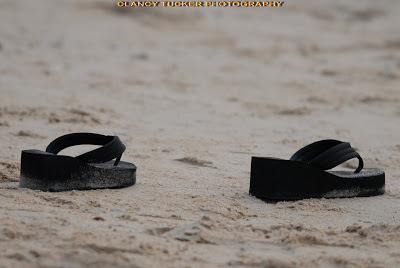
CLANCY TUCKER PHOTOGRAPHY- ODD THINGS -
G'day folks,
Well, an American National Geographic photographer once told me that I take the photographs everyone misses. I guess it's all about perception. Mm ... you be the judge.



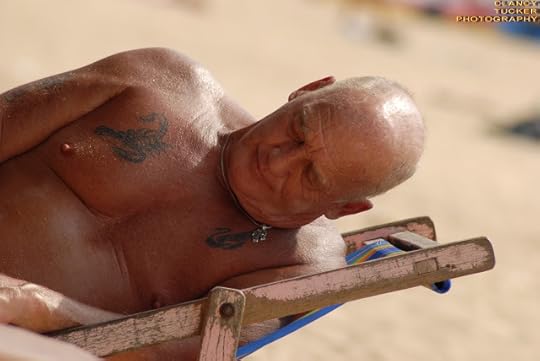




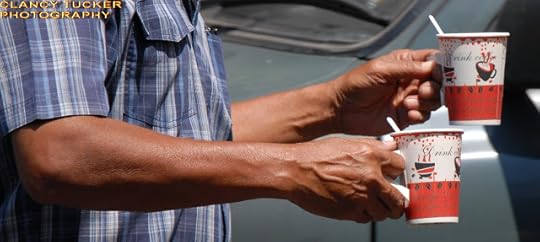




















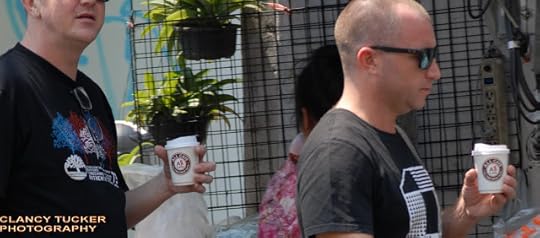

Clancy's comment: Mm ... Maybe that American was right. A good friend recently asked me if I planned a shot before taking it. My response was spontaneous, "I see something, hold the camera still and press the button. That's it."
I'm ...

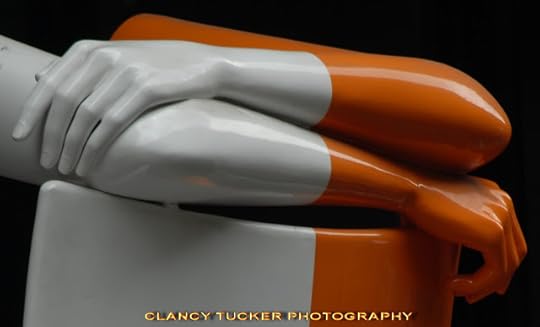
Published on May 05, 2016 16:07
May 4, 2016
5 May 2016 - MA BARKER
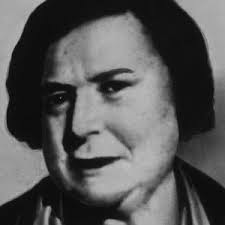
MA BARKER
G'day folks,
Now, here is a wild mob. Ma Barker was the matriarch of the Barker-Karpis Gang, whose spree of kidnappings, murders and bank robberies led to her and its members' violent deaths.
Synopsis
Ma Barker was born on October 8, 1873, in Ash Grove, Missouri. She had four sons: Herman, Lloyd, Arthur and Fred, who, with Alvin Karpis, formed the Barker-Karpis Gang in 1931. That year, Fred and Alvin shot a sheriff to death. The murder started a pattern of thoughtless killing by the gang. Ma Barker became a wanted woman. On January 16, 1935, Ma and Fred where shot and killed by FBI agents in Oklawaha, Florida.
Ma Barker was born Arizona Donnie Clark on October 8, 1873, to a poor family in Ash Grove, Missouri. Her parents were of Irish and Scottish descent. Clark was a headstrong girl with dark penetrating eyes and a nasty temper. Along with her siblings, she attended church regularly and spent her free time singing and playing the fiddle.
As a child, Clark witnessed local outlaw Jesse James and his gang ride through her hometown. The sight triggered her thirst for adventure and was a catalyst for her life to come.
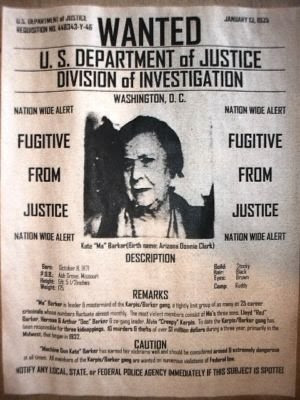
In 1892, Clark married a man who would fail to quench that thirst—a poor, soft-spoken tenant farmer named George Barker. Over the next decade, the couple had four sons: Herman, Lloyd, Arthur (nicknamed Doc) and Fred. (Arizona Clark had by then had adopted the nickname "Kate," and taken her husband's last name.)
As the Barker boys aged, they were constantly in trouble with the law. Herman, the oldest, was arrested in 1910 for petty thievery. By the time Barker's two youngest, Doc and Fred, had reached their teen years, all four sons were repeatedly landing themselves in prisons and reformatories. But Kate Barker refused to discipline her boys and would fly into a rage at anyone, including her husband, who tried to scold them. After the family relocated to Tulsa in 1915, George left Kate.
Barker-Karpis Gang
In the spring of 1931, Ma Barker's youngest son, Fred, was unexpectedly paroled from Lansing Prison, in Kansas. Fred brought with him a fellow parolee named Alvin Karpis. He and Fred agreed to become partners in crime. Ma approved of the newly formed Barker-Karpis Gang and let them use her Tulsa shack as a hideout. Living vicariously through the exploits of her boys offered Ma the adventure she had always craved.
Fred and Alvin quickly went to work, committing a series of burglaries and small?time bank robberies. In December 1931, they robbed a department store in West Plains, Missouri. The next day, they shot and murdered the town's Sheriff, C. R. Kelly, at point blank range. Kelly's murder started a pattern of excessive violence and thoughtless killing that soon became the trademark of the Karpis-Barker Gang. For the first time, Ma Barker became a wanted woman.
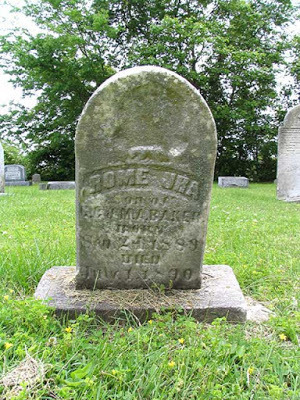
On March 29, 1932, Fred, Alvin and three accomplices robbed the Northwestern National Bank in Minneapolis and made a clean getaway. The Barker?Karpis Gang got away with more than a quarter of a million dollars in cash and bonds.
In September of 1932, Ma's son Doc was paroled from a murder sentence at the same time that his brothers were free. The Barker gang was back at full strength and more menacing than ever. With Ma's blessing, they quickly plotted another bank job for December, at the Third Northwestern National Bank in Minneapolis. This time, however, they failed to adequately think the job through. The consequence was a violent shootout with the police, which only served to solidify their reputation as the most vicious criminal gang in America.
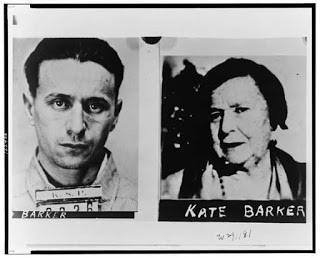
Another shootout between the Barkers and the authorities would occur on the morning of January 16, 1935, when the FBI raided the house in Oklawaha, Florida, where Ma and Fred were staying. Heavily armed FBI agents surrounded the house and ordered the pair to surrender. With no reply, the agents threw tear gas canisters at the windows. Fred fired a machine gun and a shootout began that left the house riddled with bullets. Fred and Ma fought for their lives, shooting back with everything they had. Finally, after four hours, the federal agents began to run out of ammunition and the scene became deathly quiet. Ma and Fred Barker were found together, dead in an upstairs bedroom. A stash of weapons and thousands of dollars were recovered at the house.

Clancy's comment: Wow. What a wild mob, eh?
I'm ...


Published on May 04, 2016 15:47
May 3, 2016
4 May 2016 - BRITISH SLANG

BRITISH SLANG
G'day folks,
Time for some more British slang.
Morish - Also spelt "moreish", this word is used to describe desserts in my house, when a single helping is simply not enough. You need more! It applies to anything - not just desserts.
Mufti - An old army term for your "civvies". Civilian clothes that is, rather than your uniform.
Mug - If someone is a bit of a mug, it means they are gullible. Most used car salesmen rely on a mug to show up so they can sell something!
Mush - Rhymes with "push". Slang word for your mouth as in "shut your mush". Also means mateas in "Alright mush?. Which means "Hi"!
Mutt's nuts - If something is described as being "the Mutt's" then you'll know it is fantasticor excellent. "The Mutt's" is short for "The Mutt's nuts" which is clearly another way of saying the "Dog's Bollocks"! All clear now?
Naff - If something is naff, it is basically uncool. Anoraks are naff, salad cream is also naff. You could also use it to tell someone to naff off, which is a politer way of telling them to f*** off!

Nancy boy - If someone is being pathetic you would call them a nancy or a nancy boy. It is the opposite of being hard. For example in cold weather a nancy boy would dress up in a coat, hat, gloves and scarf and a hard guy would wear a t-shirt. It's also another word for a gayman.
Nark - If someone is in a nark, it means they are in a bad mood, or being grumpy. It's also the word for a spyor informant. For example a coppers nark is someone who is a police informant - which you might call a stoolie or stool-pigeon. The origin is from the Romany word, nak, meaning "nose".
Narked - In the UK you would say that someone looked narked if you thought they were in a bad mood. In the US you might say that someone was pissed. We definitely would not say that, as it would mean they were drunk!
Nesh - My Dad used to call me a nesh wimp when I was a kid and I wanted him to take me places in his car because it was too cold to go on my bike. He meant I was being pathetic or a bit of a nancy boy. He might have had a point!
Nice one! - If someone does something particularly impressive you might say "nice one"! to them. It is close the Texan good job that you hear all the time.
Nick - To nick is to steal. If you nick something you might well get nicked.
Nicked - Something that has been stolenhas been nicked. Also, when a copper catches a burglar red handed he might say "you've been nicked"!
Nitwit - See twit.
Nookie - Nookie is the same as hanky panky. Something you do with your bird!
Nosh - Food. You would refer to food as nosh or you might be going out for a good nosh up, or meal! Either way if someone has just cooked you some nosh you might want to call it something else as it is not the nicest word to describe it.
Not my cup of tea - This is a common saying that means something is not to your liking. For example if someone asked you if you would like to go to an all night rave, they would know exactly what you meant if you told them it was not exactly your cup of tea!

Nowt - This is Yorkshire for nothing. Similarly owt is Yorkshire for anything. Hence the expression "you don't get owt for nowt". Roughly translated as "you never get anything for nothing" or "there's no such thing as a free lunch".
Nut - To nut someone is to head butt them. Nutting is particularly useful when at a football match.
Off colour - If someone said you were off colour they would mean that you look pale and ill! Not quite the same as something being off colour in the US!
Off your trolley - If someone tells you that you're off your trolley, it means you have gone raving bonkers, crazy, mad!
On about - What are you on about? That's something you may well hear when visiting the UK. It means what are you talking about?

Clancy's comment: Right you are, Governor. I'm off to get some nosh.
I'm ...


Published on May 03, 2016 15:20
May 2, 2016
3 May 2016 - BARACK OBAMA WISDOM

BARACK OBAMA WISDOM
G'day folks,
Here are some quotes from the President of the USA. Barack Hussein Obama II is an American politician serving as the 44th President of the United States, and the first African American to hold the office.
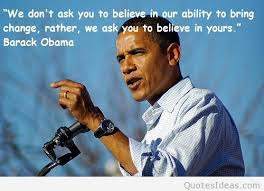

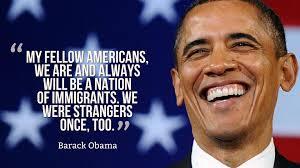

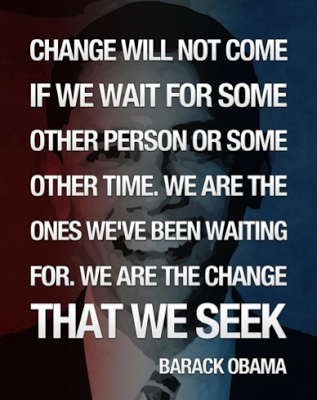
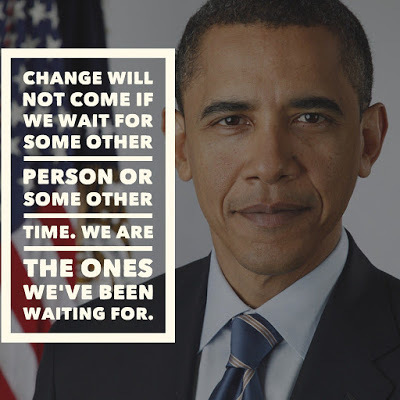
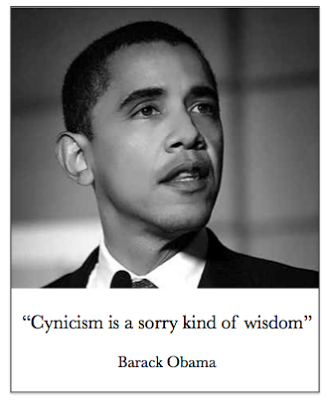


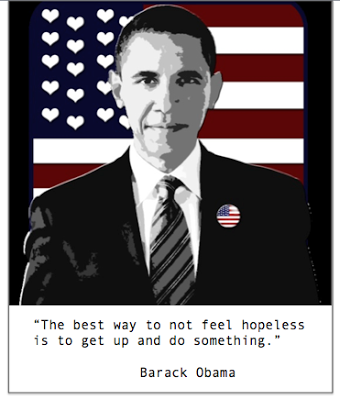



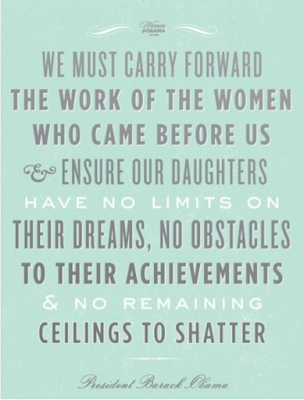


Clancy's comment: I like this bloke, having listened to many of his speeches. He, like Bill Clinton, is one of the best stand-up talkers going. Not an easy job that's for sure.
 Know someone who would make an excellent guest on my blog? I'm always seeking interesting people, and they do not have to be writers, authors or poets. In fact, I enjoy interviewing folks who have had an interesting life, or have something to say. If you do, tell them not to be shy, and give them my email address: clancy_tucker@hotmail.com
Know someone who would make an excellent guest on my blog? I'm always seeking interesting people, and they do not have to be writers, authors or poets. In fact, I enjoy interviewing folks who have had an interesting life, or have something to say. If you do, tell them not to be shy, and give them my email address: clancy_tucker@hotmail.comI'm ...


Published on May 02, 2016 16:01
May 1, 2016
2 May 2016 - SHARYN BAJERAI - GUEST AUTHOR
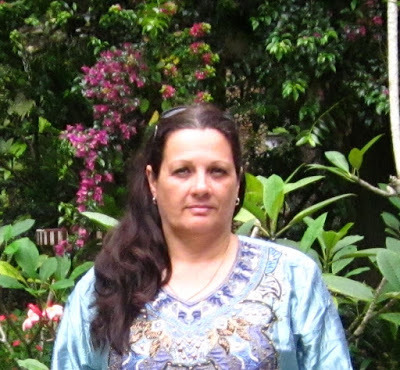
SHARYN BAJERAI
- Guest Author -
G'day folks,
Welcome to an interview conducted with an enthusiastic Australian author.
Welcome, Sharyn ...
TELL US A LITTLE ABOUT YOURSELF AND YOUR WRITING JOURNEY.
As a young girl I’ve always had a love for books. It wasn’t until later in life I decided to have a go at writing my first children’s book. I felt encouraged to continuing writing after entering competitions many years later and receiving awards for my children’s short stories.
WHEN AND HOW DID YOU BECOME A WRITER?
Even before my kids could talk, I was reading to them. Then one day, I decided it can’t be that hard to write a story for young children. Looking back at the first story I wrote twenty years ago, I now realise I have come a long way. It isn’t as easy as it looks to capture the imagination of young children and write something they can get excited about reading.
DO YOU PLAN EVERYTHING FIRST OR JUST SHOOT FROM THE HIP?
My inspiration for my stories usually come from a news article I’ve read, an advertisement on TV or just one sentence that someone has said to me. The key is to write it down straight away as not to forget it. The ideas take shape and I think the idea might just be ridiculous enough to intrigue children. I typically start with one line and shoot from the hip from there.
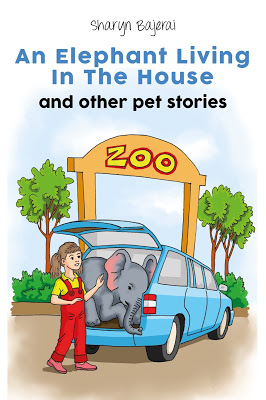
WHAT DO YOU ENJOY MOST ABOUT BEING A WRITER?
My favourite part to a story is adding a twist at the end. It will create the surprise factor and I like to think it will get a good response from the children. After all, those were the stories my children and I enjoyed when I read to them.
WHAT IS THE HARDEST THING ABOUT BEING A WRITER?
By far the most difficult thing about being a writer is when to know if the story is complete or good enough for others to read. If I am not happy with the story, it can take months to tweak the idea and get it just right.
WHAT WERE YOU IN A PAST LIFE, BEFORE YOU BECAME A WRITER?
Before I entered into the fantasy world of children’s stories I was a Bank Clerk and full time mum. It was becoming a parent to four children and reading to them that pushed me to think writing for them and other children could be something I’d enjoy.
WHAT IS YOUR GREATEST WRITING ACHIEVEMENT?
My greatest achievement is being published! I have had two manuscripts published in the NSW Curriculum and Learning Innovation Centre, School Magazine.
WHAT ARE YOU WORKING ON AT THE MOMENT?
After getting my first e-book “An Elephant living in the house and other pet stories” for young readers, I am excited to get my second collection up and I am in the process of compiling it.
WHAT GENRE DO YOU WRITE?
The genre that I choose to write are books for children- mostly picture and early readers. I have also written a few junior novels.
DO YOU HAVE ANY TIPS FOR NEW WRITERS?
My three tips for new writers are simple: Read! Practice, practice and practice, and never give up.
DO YOU SUFFER FROM WRITER’S BLOCK?
Every writer would get writer’s block in some form. Sure, I experience it too, but there is always tomorrow.
DO YOU HAVE A FAVOURITE WRITING PLACE?
I don’t have a favourite corner or room but one thing is for sure, if the place is quiet and I’ve got my laptop, then I can get lost in my writing for hours.
WHO IS YOUR FAVOURITE AUTHOR AND WHY?
Every few months I find a new exciting author on the shelves of my library, and if I like a book of theirs, I keep with their books for a while. I don’t really have a favourite author, I just enjoy reading a book that tells a great story.

WHAT’S THE GREATEST COMPLIMENT YOU EVER RECEIVED FROM A READER?
I used to belong to a writing group before it folded. One session we all wrote down what we thought of each other and our writing on paper and passed it on. Some of the comments were very touching. I still keep those pieces of paper to help keep my spirits up when I am trying to get a story just right.
OTHER THAN WRITING, WHAT ELSE DO YOU LOVE?
In my spare time I like to indulge in reading a new book, travelling, walking in nature and spending time with my family.
DID YOU HAVE YOUR BOOK / BOOKS PROFESSIONALLY EDITED BEFORE PUBLICATION?
Before publication, I send my manuscripts to Sally Odgers for critiquing and a final edit. I think I’m addicted to her comments, they really helped me.

WHAT WOULD YOU SAY IF YOU HAD THE CHANCE TO SPEAK TO WORLD LEADERS?
Across the world, world leaders seem not care about the little people, it has all become a race to make money and become powerful. It would be great to see them stop wasting money and put it into projects that benefit mankind.
DO YOU SEE YOURSELF IN ANY OF YOUR CHARACTERS?
I did not portray myself in any of my stories, but I feel like some of my characters are based on my children and people I know. Some of my ideas came from some of the things my children use to do or say when they were younger. My eldest son enjoyed the water so much that I wrote a story about a boy who could breathe under water.
DID YOU EVER THINK OF QUITTING?
I’ve never considered quitting writing, it is something I started out of passion and I never thought of publishing back then. To me it doesn’t matter if you are never published. I once did a story and added pictures from ‘clip art’ (because I can’t draw to save my life) and my daughter’s teacher added questions and made it into class books. I never got paid for it but I thoroughly enjoyed seeing the children benefit from my writing.
WHAT WAS YOUR FAVOURITE MANUSCRIPT TO WRITE? WHY?
My favourite piece of writing would have to be my story “Lee” which is about a boy who finds a stray greyhound and needs to find a way to keep him. I sat down one afternoon and wrote the story from beginning to end. It was a story just itching to be written.

HOW WOULD YOU DEFINE ‘SUCCESS’ AS A WRITER?
The most fulfilling part to being a writer than makes me think “Yes I’ve done it” is to type the words “The End” at the end of a story. I would see it as a success not to leave a story unfinished.
WHAT’S YOUR ULTIMATE DREAM?
Apart from travelling the world, I wish I had the artistic skills to illustrate my own books.
ARE YOUR BOOKS SELF-PUBLISHED?
My son-in-law encouraged me to put some stories together and helped me to self-publish the collection as an e-book. Without his help it never would have happened.
WHAT WOULD BE THE VERY LAST SENTENCE YOU’D WRITE?
Everybody should have the opportunity to read.
ANYTHING YOU’D LIKE TO ADD?
I think your photo’s are amazing Clancy! They capture the moment.

FACEBOOK FACTS

Clancy's Comment: There ya go, folks. Another Aussie author is up and running. Well done, Sharyn.
I'm ...


Published on May 01, 2016 15:52
April 30, 2016
1 May 2016 - ONE-LINERS

ONE-LINERS
G'day folks,
Here are some one-liners to make you smile ... Or throw up.
Always wanted to be a procrastinator, but never got around to it.
~~~~~
My friend has kleptomania, but when it gets bad, he takes something for it.
~~~~~
Did you hear about the big fight that Madonna, Cher, Jewel, and Fabio had?
They're no longer on a first-name basis.
~~~~~
It is hard to understand how a cemetery raised its burial cost
and blamed it on the cost of living.
~~~~~
If you take a shower in the morning be sure to bring it back,
someone else might need it!!
~~~~~
When everything's coming your way, you're in the wrong lane.
~~~~~
Everyone has a photographic memory. Some don't have film.
~~~~~
I couldn't repair your brakes, so I made your horn louder.
~~~~~
How do you tell when you run out of invisible ink?
~~~~~
Why do psychics have to ask you for your name?
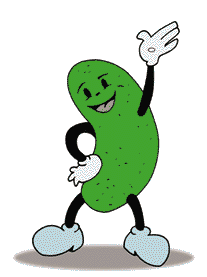
Just when you think you've hit bottom, someone tosses you a shovel.
~~~~~
Never go to a doctor whose office plants have died.
~~~~~
For Sale: Wedding dress, size 12, worn once by mistake.
~~~~~
You know you are over-the-hill when you're just too tired to climb one!
~~~~~
Why is stuff sent on ships called "cargo" and UPS sends "shipments?"
~~~~~
Never criticize your wife's faults.
It might have been those faults that kept her from getting a better husband.
~~~~~
For Sale: One computer slightly used. One bullet hole in screen.
~~~~~
If a "fatal" error is made with the E-mail I sent, does that mean I killed somebody?
~~~~~
What's the speed of dark?
~~~~~
Other than that, Mrs. Lincoln, how did you enjoy the play?
~~~~~
It's a small world -- unless you gotta walk home.
~~~~~
Why are there Interstate highways in Hawaii?
~~~~~
I'm going to start thinking positive, but I know it won't work.
~~~~~
At age 66 I'm bisexual. I said bye to sex.
~~~~~
Two wrongs don't make a right, but two Wrights make an airplane.
~~~~~
"It is better to have loved a short man, than never to have loved a tall."
~~~~~
Money talks but all mine ever says is "goodbye."
~~~~~
If the #2 pencil is the most popular, why isn't it #1?
~~~~~
The other night I laid in bed looking up at the stars and I thought to myself,
"Where the heck is the roof?"
~~~~~
With proper diet, rest, and exercise a healthy body will last a lifetime.
~~~~~
Help Wanted - Psychic - you know where to apply.
~~~~~
Light travels faster than sound.
That's why some people appear bright until you hear them speak.
~~~~~
He who laughs last, thinks slowest.
~~~~~
Change is inevitable, except from a vending machine.
~~~~~
I just got lost in thought. It was unfamiliar territory.
~~~~~
When the chips are down, the buffalo is empty.
~~~~~
Seen it all, done it all, can't remember most of it.
~~~~~
He's not dead, he's electroencephalographically-challenged.
~~~~~
Nothing is foolproof to a sufficiently talented fool.
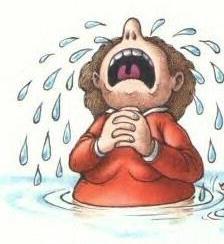
The 50-50-90 Rule:
Anytime you have a 50-50 chance of getting something right,
there's a 90% probability you'll get it wrong.
~~~~~
It is said that if you line up all the cars in the world end to end,
someone would be stupid enough to try to pass them.
~~~~~
You can't have everything - where would you put it?
~~~~~
If the shoe fits, get another one just like it.
~~~~~
The things that come to those that wait
may be the things left by those who got there first.
~~~~~
Flashlight: A case for holding dead batteries.
~~~~~
As long as there are tests, there will be prayer in public schools.
~~~~~
A fine is a tax for doing wrong. A tax is a fine for doing well.
~~~~~
I wished the buck stopped here, as I could use one.
~~~~~
When you go into court you're putting yourself in the hands of 12 people
who weren't smart enough get out of jury duty.
~~~~~
I've always wanted to be somebody, but I should have been more specific.
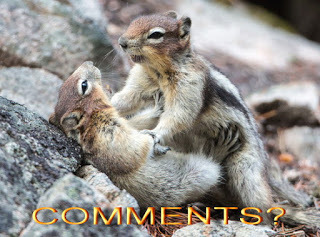
Clancy's comment: Some were fairly lame, eh? However, some made me think.
I'm ...


Published on April 30, 2016 19:41
April 29, 2016
30 April 2016 - DOLORES HUERTA
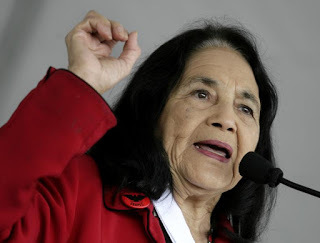
DOLORES HUERTA
G'day folks,
Welcome to another outspoken woman. Dolores Clara Fernández Huerta is an American labor leader and civil rights activist who was an early member of the National Farmworkers Association, which later became the United Farm Workers.
Synopsis
Dolores Huerta has worked to improve social and economic conditions for farm workers and to fight discrimination. To further her cause, she created the Agricultural Workers Association (AWA) in 1960 and co-founded what would become the United Farm Workers (UFW). Huerta stepped down from the UFW in 1999, but she continues to her work to improve the lives of workers, immigrants and women.
Activist and labor leader Dolores Fernández, better known as Dolores Huerta, was born April 10, 1930, in Dawson, New Mexico, the second child of Juan and Alicia (Chavez) Fernandez. The young family struggled and by the time Dolores was three, her parents divorced and her mother moved Dolores and her two brothers to Stockton, California. Dolores maintained a relationship with her father, who later became a union activist and a New Mexico state assemblyman. Juan’s own political and labor activism later proved inspirational to Dolores.
When the family first arrived in Stockton, a farming community in the San Joaquin Valley, Alicia worked two jobs to provide for the family. Dolores’ grandfather, Herculano Chavez, took care of the children, serving as the children’s adult male figure. Dolores admired her mother who was always encouraged her children to get involved in youth activities and become something. Alicia worked hard to provide music lessons and extracurricular activities for Dolores and her brothers. Dolores played violin, piano and took dance lessons. A good student, she was also a Girl Scouts up until she turned 18 and she won second place in a national essay contest.
Growing up, Dolores experienced the racism many Mexican and Mexican Americans suffered from, especially those who were farm workers. At school, she was sometimes treated with suspicion and scorn. She was once accused by a teacher of stealing another student’s work because was convinced Dolores was incapable, due to her ethnic origin. Despite this, the family’s economic conditions improved. During World War II, Alicia ran a restaurant and then purchased a hotel in Stockton with her second husband, James Richards. The businesses served the farmworkers and day laborers.
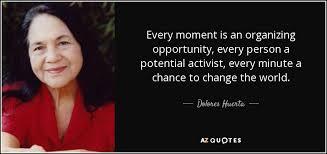
After graduating from Stockton High School, in 1947, Dolores Fernandez went through a marriage, the birth to two children, and a divorce. After a series of unsatisfying jobs, she returned to school and eventually completed a teaching degree at Stockton College, part of the University of the Pacific. She briefly worked as an elementary school teacher, but resigned because she was so distraught over the poor living conditions of her students, many of them children of farm workers. Determined to help, in 1955, she and Frank Ross started the Stockton chapter of the Community Services Organization (CSO), a grass-roots group that worked to end segregation, discrimination and police brutality and improve social and economic conditions of farm workers. During this time, Dolores married Ventura Huerta, another labor activist. The couple would go on to have five children.
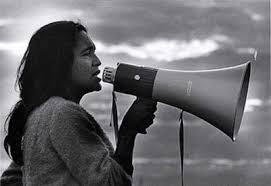
A Life of Activism
In 1965, the AWA and the FWA combined to become the United Farm Workers Organizing Committee (later, UFW). That year, the union took on the Coachella Valley grape growers, with Chavez organizing a strike of all farm workers and Huerta negotiating contracts. After five hard years, the United Farm Workers (now affiliated with the AFL-CIO) signed an historic agreement with 26 grape growers, which improved working conditions for farm workers, including reducing the use of harmful pesticides, and initiating unemployment and healthcare benefits. In the 1970s, Huerta coordinated a national lettuce boycott and helped create the political climate for the passage of the 1975 Agricultural Labor Relations Act, the first law to recognize the rights of farmworkers to bargain collectively.
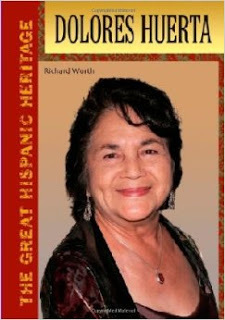
During the 1980s, Dolores Huerta served as Vice-president of the UFW and cofounded the UFW’s radio station. She continued to speak for a variety of causes, advocating for a comprehensive immigration policy and better health conditions for farm workers. In 1988, she nearly lost her life when she was beaten by San Francisco police at a rally protesting the policies of then-presidential candidate George H. W. Bush. She suffered six broken ribs and a ruptured spleen.
Later Life
Dolores Huerta has been honored for her work as a fierce advocate for farm workers, immigration, and women. She received the Ellis Island Medal of Freedom Award and was inducted in the National Women’s Hall of Fame in 1993. That year proved bitter-sweet for her as she also experienced the passing of her beloved friend Cesar Chavez. In 1998, she received the Eleanor Roosevelt Award, a year before she stepped down from her position at the United Farm Workers. In 2002, she received the Puffin Foundation/Nation Institute Award for Creative Citizenship. The $100,000 award provided her the means to create the Dolores Huerta Foundation’s Organizing Institute, whose purpose is to bring organizing and training skills to low-income communities. Huerta continues to lecture and speak out on a variety of social issues involving immigration, income inequality, and the rights of women and Latinos.
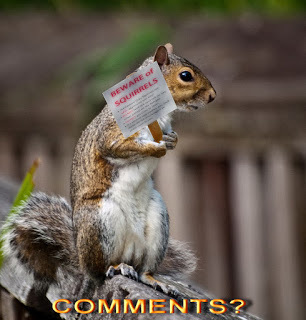
Clancy's comment: Go, Dolores! Yep, things don't change unless someone gets up and barks. Love ya work!
I'm ...


Published on April 29, 2016 15:40
April 28, 2016
29 April 2016 - WRITING TIPS

WRITING TIPS
G'day folks,
Here are some tips for you writers, compliments of IUniverse Publishing … And some authors who have been there and done that.
Tip1: "My first rule was given to me by TH White, author of The Sword in the Stone and other Arthurian fantasies and was: Read. Read everything you can lay hands on. I always advise people who want to write a fantasy or science fiction or romance to stop reading everything in those genres and start reading everything else from Bunyan to Byatt." — Michael Moorcock
Tip 2: "Protect the time and space in which you write. Keep everybody away from it, even the people who are most important to you." —Zadie Smith
Tip 3: "Introduce your main characters and themes in the first third of your novel. If you are writing a plot-driven genre novel make sure all your major themes/plot elements are introduced in the first third, which you can call the introduction. Develop your themes and characters in your second third, the development. Resolve your themes, mysteries and so on in the final third, the resolution." — Michael Moorcock
Tip 4: "In the planning stage of a book, don't plan the ending. It has to be earned by all that will go before it." —Rose Tremain
Tip 5: "Always carry a note-book. And I mean always. The short-term memory only retains information for three minutes; unless it is committed to paper you can lose an idea for ever." — Will Self
Tip 6: "It's doubtful that anyone with an internet connection at his workplace is writing good fiction." — Jonathan Franzen
"Work on a computer that is disconnected from the internet." — Zadie Smith
Tip 7: "Interesting verbs are seldom very interesting." — Jonathan Franzen
Tip 8: "Read it aloud to yourself because that's the only way to be sure the rhythms of the sentences are OK (prose rhythms are too complex and subtle to be thought out—they can be got right only by ear)." — Diana Athill
Tip 9: "Don’t tell me the moon is shining; show me the glint of light on broken glass." – Anton Chekhov
Tip 10:"Listen to the criticisms and preferences of your trusted 'first readers.'" — Rose Tremain

Tip 11:"Fiction that isn't an author's personal adventure into the frightening or the unknown isn't worth writing for anything but money." — Jonathan Franzen
Tip 12:"Don't panic. Midway through writing a novel, I have regularly experienced moments of bowel-curdling terror, as I contemplate the drivel on the screen before me and see beyond it, in quick succession, the derisive reviews, the friends' embarrassment, the failing career, the dwindling income, the repossessed house, the divorce . . . Working doggedly on through crises like these, however, has always got me there in the end. Leaving the desk for a while can help. Talking the problem through can help me recall what I was trying to achieve before I got stuck. Going for a long walk almost always gets me thinking about my manuscript in a slightly new way. And if all else fails, there's prayer. St Francis de Sales, the patron saint of writers, has often helped me out in a crisis. If you want to spread your net more widely, you could try appealing to Calliope, the muse of epic poetry, too." — Sarah Waters
Tip 13:"The writing life is essentially one of solitary confinement – if you can't deal with this you needn't apply." — Will Self
Tip 14:"Be your own editor/critic. Sympathetic but merciless!" — Joyce Carol Oates
Tip 15:"The reader is a friend, not an adversary, not a spectator." — Jonathan Franzen
Tip 16:"Keep your exclamation points under control. You are allowed no more than two or three per 100,000 words of prose. If you have the knack of playing with exclaimers the way Tom Wolfe does, you can throw them in by the handful." — Elmore Leonard
Tip 17:"Remember: when people tell you something's wrong or doesn't work for them, they are almost always right. When they tell you exactly what they think is wrong and how to fix it, they are almost always wrong." — Neil Gaiman
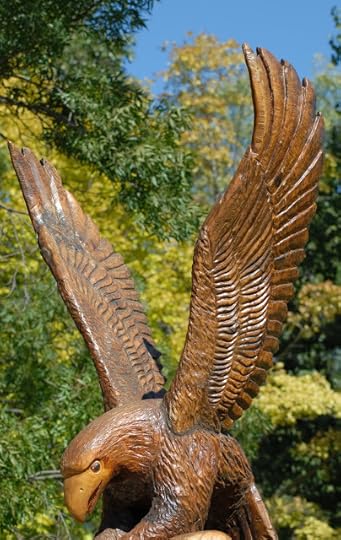
Tip 18: "You know that sickening feeling of inadequacy and over-exposure you feel when you look upon your own empurpled prose? Relax into the awareness that this ghastly sensation will never, ever leave you, no matter how successful and publicly lauded you become. It is intrinsic to the real business of writing and should be cherished." — Will Self
Tip 19: "The main rule of writing is that if you do it with enough assurance and confidence, you're allowed to do whatever you like. (That may be a rule for life as well as for writing. But it's definitely true for writing.) So write your story as it needs to be written. Write it honestly, and tell it as best you can. I'm not sure that there are any other rules. Not ones that matter." — Neil Gaiman
Tip 20:"The nearest I have to a rule is a Post-it on the wall in front of my desk saying ‘Faire et se taire’ (Flaubert), which I translate for myself as ‘Shut up and get on with it.’" —Helen Simpson

Clancy's comment: Thank you to IUniverse Publishing. Great collection of tips. So, get on with it ...
I'm ...


Published on April 28, 2016 14:47



